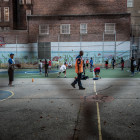
OP-ED: The Kid Brain and the Adult Criminal Justice System
|
Dzhokhar Tsarnaev was 19 when he and his brother, aged 26, allegedly carried out the Boston Marathon Bombing and a slew of other crimes. Dzhokhar was seriously wounded in a subsequent gunfight, and his brother was killed. U.S. Attorney General Eric Holder announced last week that the federal government will seek the death penalty in the case. As JJIE contributor Tamar Birckhead points out in an interview on CBS News' Crimesider, the decision to pursue the death penalty is problematic given Tsarnaev’s youth. “The younger you are, the less culpable you are for your crimes,” Birckhead said.










